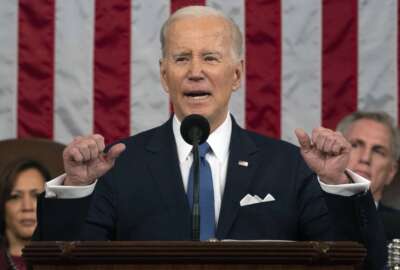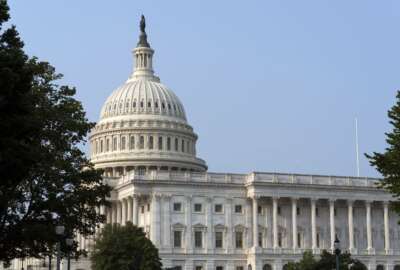
For contractors, the 2024 budget request doesn’t quite add up
Federal contractors don't see a lot of room for growth after inflation in fiscal 2024, with a few large agencies actually requesting a reduction in funding rela...
Federal contractors don’t see a lot of room for growth after inflation in fiscal 2024, with a few large agencies actually requesting a reduction in funding relative to what was enacted in 2023. For a few observations, the Federal Drive with Tom Temin spoke to Stephanie Kostro, executive vice president for Policy at the Professional Services Council.
Interview transcript:
Tom Temin And before we get to that, though, Stephanie, I wanted to ask you about something a little bit more topical right now. And that is a new solicitation came out called [Twenty-One Total Technology Next Generation 2 (T4NG2)], from the Veterans Affairs Department. And there’s a little consternation over that one.
Stephanie Kostro The T4NG2 stands for, for those in your listenership that don’t know, Transformation Twenty-One Total Technology Next Generation2. So, of course, everyone calls it T4NG2, because why wouldn’t you? It is a ten-year contract vehicle worth 60 to $61 billion. So there is a lot of heightened interest within the federal contracting community, for obvious reasons. They did, however, as a follow on vehicle kind of rushed through, in our opinion, at the solicitation process. They had a couple of opportunities to comment on draft solicitations, the draft RFP’s. But those turnaround times were about four business days each. And so what led us to conclude, from that situation, is that the Veterans Affairs Department wasn’t particularly interested in a lot of meaningful industry feedback. And so the final solicitation came out here on March 14. Proposals are due a month later, on April 14, and we’ve got a lot of folks in the contracting community worried about whether they’re actually competitive, and I’ll give you a couple of examples. One, is the final solicitation sets up the small business and the veterans employment opportunities to be gamed in the system, it is about a point system for this. So there are those who are small businesses, organic small businesses who want to go it alone, who might not be able to compete in this way. And I think that might run counter to some of what the administration is trying to do with small businesses, which is to encourage them.
Tom Temin Well, how can they game the system? Or what’s the point system that favors companies joining up with large companies, it sounds like.
Stephanie Kostro They are encouraging joint ventures and teaming arrangements. What I found interesting, and this is a direct quote from one of our member companies, is that you could drive a mack truck through the requirements. This is a Veterans Affairs solicitation focused on health information technology and customer experience. There’s not a lot of mention of health IT and customer experience in the requirements. So we do wonder whether the contracting offices and evaluation offices are talking to the program managers about what they really need. The gaming comes into play when it’s a point system and you got to figure out who you can partner with, and whether or not they have VA experience seems to be relatively immaterial.
Tom Temin So then do you expect there would be, the association would not do this, but I wonder if it could engender some pre-award protests. That’s been known to happen with big IDIQ’s around here.
Stephanie Kostro It’s actually more the rule, that exception, I think. And I think you’re exactly right, Tom. This does open itself up to protest. And so we’ll have to see what happens in that landscape on that part of it.
Tom Temin And you mentioned there were a couple of short periods in which industry could comment. Is there evidence that any of the commentary that came in? I guess eight days total was incorporated into the final solicitation?
Stephanie Kostro There were some tweaks made, but overall, when we look at the solicitation, we do wonder how much they actually incorporated. We’re still waiting to see, or at least I’m waiting to see the second round of Q&A and how they answered some of the questions that were posed. But overall, this does look very similar to the previous versions. And we look forward to seeing how the VA evaluates the proposals when they get them. Of course, protests are always the sticky wicket for them.
Tom Temin All right. We’re speaking with Stephanie Kostro, executive vice president for policy at the Professional Services Council. And continuing on the VA theme, it’s getting under the president’s request anyway, for 2024, a 2.2% overall budget increase. That’s among the skinnier increases we’re seeing. And there’s a couple of large departments that are actually getting decreases under the request. Again, anything could happen, but it shows a philosophical approach, if that’s what you consider a budget. And you’re concerned about the inflation effects in budgets of that nature.
Stephanie Kostro We are, Tom, and thanks for bringing this up. We hear a lot in the news about the defense budget and what’s happening on that front. And we’ve got a lot of budget detail from the Defense Department so we can unpack that. On the civilian agency side, there’s a really vast discrepancy among some of the agencies. Overall, the administration is correct in saying civilian agencies are seeing a 6.2% increase over last year, and it looks like that might reflect a calculation of 2.4% inflation. And I would love 2.4% inflation at this point, because, obviously, over the last 12 months we have seen it range from that to a high of some 9%. And so, the increase of 6.2 across all the civilian agencies is not evenly spread. As you noted, the VA has roughly a 2.2% increase. It’s not matching that inflation budget. So in real terms, you wonder, what exactly are they cutting here? There are some agencies that are seeing huge increases. [Environmental Protection Agency (EPA)], 19% increase. USDA has a 14% increase. I will say some of the notable lows, transportation is seeing a 2.9% decrease. The administration may argue on that, because they are moving some pieces of the discretionary budget or they’re proposing to move some pieces into the mandatory column. And so when we’re looking at a 2.9% decrease in discretionary, we got to factor in what they’re trying to move to mandatory. So it’s interesting to see what exactly is being played around with here. And I’m looking forward to seeing some of the budget details for the civilian agencies.
Tom Temin And what are you seeing, in terms of labor rate possibilities for contractors? Given that federal employees and so forth are scheduled for some kind of a decent raise, anyway. Four or 5%, we don’t know what will end up being, but the president has indicated 5% or 5.2.
Stephanie Kostro Tom, thanks for bringing that up. I want to be clear that the Professional Services Council and our member companies are happy that the civilians in the military are getting a 5.2% proposed increase here. The problem that we’re facing, as a contractor community, is that we’re not seeing a similar increase in labor rates for contractors. This, in essence, tends to squeeze out an already stretched workforce, when they can make more money on the commercial marketplace for labor than they can in contracts. And so when you’re increasing pay for military and civilian, we are all for that. But we’re not seeing a commitment or a comparable increase on the contractors side. And that really makes a tough labor market even tougher.
Tom Temin And some of these agencies that are getting large increases. You mentioned EPA, for example, National Science Foundation is getting a whopper of an increase, transportation down a little bit. Any sense of what types of professional services are going to be in demand? And how that might differ at all from the current picture?
Stephanie Kostro We’re seeing a lot of movement, Tom, on the cyber and the tech side. We talked, you and I, about the technology modernization fund a while ago, and that is also seeing a proposed budget of $200 million. Last year, they proposed $300 million. And you may remember, in the American Rescue Plan Act, [Technology Modernization Fund (TMF)] got bumped up $1 billion dollars. So we’re seeing additional movement on the tech in the cyber side. If you look at the president’s budget, the main document that was released. It mentioned cyber 49 times. That’s a really, really high number of times mentioning cyber. Looking at places like CISA, the Cybersecurity Infrastructure Security Agency over at [Department of Homeland Security (DHS)], seeing a $3.1 billion budget for them, which is an increase of 145 million just for resilience. There’s a lot of movement in that space. And so, I know some of our member companies are looking very closely at what they can do in the IT cyber tech space to sort of leverage these opportunities.
Tom Temin And the final question on the Office of Federal Procurement Policy. There is no nominee yet, for administrator there. And all this rulemaking is happening here and they’re on the [Federal Acquisition Regulation (FAR)] and so forth for some of the new climate reporting rules and so on, for procurement. You’d like to see someone in there, maybe orchestrating that.
Stephanie Kostro Tom, the president has a number of nominations that are, either, still in the Senate under consideration, almost 100 over in the Senate, still waiting for a vote. He’s got some 97 that he’s not yet chosen a nominee. And three folks are waiting for a formal nomination. The administrator for the Office of Federal Procurement Policy is particularly interesting to the Professional Services Council, because that is the person who will, in theory at least, push the administration’s regulatory ball down the field. And I’ll say that, in the administration early on started talking about using acquisition as a catalyst. That was their catch phrase. And that is to say, to help advance diversity, equity, inclusion, to help advance climate change initiatives, etc. And so not having someone in that position, with all the weight of being actually confirmed by the Senate, is a little bit troubling. All that is to say, the OFPP acting administrator Leslie Field, is wonderful. She is great, but she does lack the gravitas that comes with the Senate confirmation. And so I would hope that the administration, as they look to find additional nominees for these positions, would really prioritize getting someone in that slot permanently.
Copyright © 2024 Federal News Network. All rights reserved. This website is not intended for users located within the European Economic Area.
Tom Temin is host of the Federal Drive and has been providing insight on federal technology and management issues for more than 30 years.
Follow @tteminWFED





